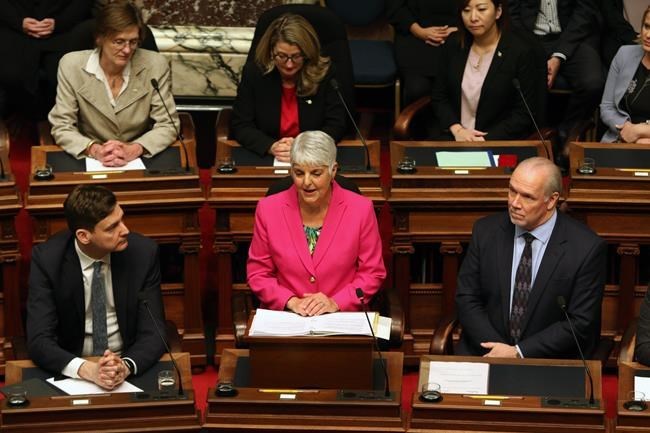Post-secondary students from low-to-middle-income families, part-time students and those enrolled in shorter duration diploma or certificate programs will be the beneficiaries of a new access grant program revealed in Tuesday's provincial budget.
The needs-based grant program, which takes effect in September, will replace the existing completion grant system, which required full-time students to apply for a student loan reduction paid for by the province at the completion of each year of study.
As many as 40,000 students in B.C. will benefit from the new program, which will provide as much as $4,000 annually to cover tuition costs and/or living expenses.
"We're celebrating on our end, we've been fighting this fight for a good year," said Damon Robinson, communications officer for the College of New Caledonia Student Union.
"It will absolutely have an effect on the students here going to CNC and UNBC and it's a huge monumental change for us. This is something we've always advocated for. It is needs-based, which is so relieving to a lot of the students here. We were cheering when we saw that.
"One of the biggest things that we hear on our end is that (paying for education is) the first step that always messes people up."
The provincial NDP government will increase funding by $24 million over three years to pay the additional cost giving more students access to the grants. The three-year plan will cost taxpayers $41 million.
Robinson said the needs-based grant system was adopted years ago by other provinces and B.C. was the one last remaining holdouts to drop the completion grant system which required students to show they were meeting the requirements of graduation. Completion grants provided up to $3,400 per year to 20,000 students in the higher-cost degree programs,
"This is going to be 40,000 students who wouldn't have had this ability to go to school comfortably," said Robinson. "Before it was based on graduation and only certain programs would qualify, it was never needs-based.
"B.C. is finally moving in line with every other province in Canada and we are very appreciative on our end. We have been making a huge push over the last month for grants, not loans. Before, it used to push you only into loans.
"It really makes us have faith, especially after the past few years. The NDP has been very welcoming to our ideas. We're going to be cheering for quite a long time."
Tuesday's announcement follows decisions made by the government last year to not charge student loan interest and to provide annual grants of up $5,500 for former youth in care students between the ages of 19 and 24.
Finance Minister Carole James said in her speech Tuesday the needs-based grant will especially help graduates find jobs with competitive salaries in healthcare, trades and childhood education.
“B.C.’s future is bright and filled with opportunity," said James. "With the new BC Access Grant, we’ll put a college or university education within reach for thousands more British Columbians. These grants will make a difference for students, and they’ll help B.C. businesses find the skilled people they need.”
To address the looming shortage of skilled labour, the NDP government has promised to complete a six-year expansion to add 2,900 new seats in science-, technology-, engineering- and mathematics-related post-secondary programs and will increase funding for those programs to $42 million by 2022-23 to produce 1,000 STEM graduates by 2023.
Chad Thompson, CNC's vice-president academic said he welcomes any policy change that will lower the costs for students and is confident the new grant will benefit some students.
"The fact they can use it for other expenses beyond just tuition is a huge help to students who increasingly today have more and more complicated lives," said Thompson. "Anything that's going to give more students more of a chance to access higher education is going to benefit Prince George and the entire northern B.C. community. We hope it's going to make it possible for students to come into the college or any other (post-secondary school) who otherwise might not have had the chance."
While fees for some of CNC programs, like health sciences diagnostics, are more expensive, trades training is at the lower end of the fee spectrum and the average annual tuition cost of a university transfer program is about $2,700 per year, which Thompson said ranks as the second-lowest in the province.
UNBC acting president Dr. Geoffrey Payne said the new grant program will provide an additional incentive for students who last year were awarded 1,200 scholarships and bursaries worth $3 million.
“The additional investments in post-secondary education announced in Budget 2020 will provide a direct benefit to eligible UNBC students,” says UNBC acting president Dr. Geoffrey Payne. “By choosing UNBC, students are investing in their education and their future success. This fall, the new BC Access Grant will be another source of funding UNBC students can access to support their learning.”
With students off for reading break, The Citizen was unable to reach a spokesperson from the Northern Undergraduate Student Society at UNBC for comment on Tuesday's budget.



